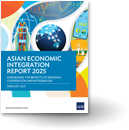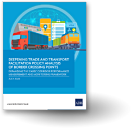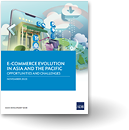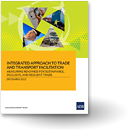Preparing the Nation for Integration: Timor-Leste’s Path to ASEAN
Timor-Leste has taken major steps toward joining the Association of Southeast Asian Nations, but challenges remain. Strengthening governance, promoting investments, expanding trade, and enhancing human capital are still needed
Timor-Leste is a young democracy facing significant development challenges. The poverty rate remains high at 41.8% and economic growth has been volatile, affected by both external and domestic shocks.
The economy relies heavily on public spending and petroleum revenues. Long-standing structural challenges such as a weak private sector, inadequate infrastructure, a lack of skilled labor, and a challenging business environment, present daunting obstacles to economic diversification and long-term growth.
Recognizing the role that regional cooperation and integration can play in addressing these challenges, Timor-Leste has long pursued membership in the Association of Southeast Asian Nations (ASEAN). This has been a strategic priority and a cornerstone of its economic development and foreign policy.
ASEAN membership is expected to drive domestic policy and institutional reforms while expanding markets and reduce costs. It should also diversify the economy, attract trade and investments, and improve access to technology and skills.
Since applying for ASEAN membership in 2011, Timor-Leste has undertaken significant reforms, investments, and policy alignments—establishing a Directorate-General for ASEAN Affairs, modernizing customs, and engaging the private sector—to meet the requirements for full membership.
Supported by partners like the Asian Development Bank, the country has accelerated capacity-building initiatives and advanced infrastructure, trade, renewable energy, and agriculture to foster broader economic opportunities.
But more needs to be done for Timor-Leste to reap the full benefits of ASEAN.
Timor-Leste requires comprehensive capacity-building initiatives to enhance the technical knowledge and skills of government officials and stakeholders. Developing and implementing targeted training workshops and seminars in key areas, especially those focused on specialized areas and sectoral drivers of growth, such as tourism or agriculture, will be crucial. Establishing mentorship programs that pair ASEAN expertise with Timor-Leste sectoral counterparts will provide knowledge transfer.
Timor-Leste has made significant progress toward ASEAN accession, but continued collaboration, investment in human capital, and infrastructure improvements remain crucial for fully integrating into the region and maximizing economic opportunities.
To ensure harmonization with ASEAN standards, expert guidance will be needed to assist in the review and improvement of government legislation, rules, and procedures. Facilitating peer-to-peer learning opportunities and best practices exchanges with other ASEAN member states that have successfully implemented core provisions will be beneficial. Providing resources and tools to assist in drafting and updating legislation to ensure compliance with core provisions is essential.
Upgrading transport infrastructure is also crucial, requiring a strategic approach involving the development of comprehensive transport plans, substantial financial investments, and the engagement of specialized transport engineering expertise.
Key areas of support include sustainable financing for road maintenance, capacity building, and technical assistance to strengthen planning, monitoring, and project supervision. Enhancing border protection and monitoring, improving equipment and resource allocation, and incorporating environmentally sustainable practices are also key elements.
By aligning with international standards and focusing on regional integration, Timor-Leste can foster connectivity, streamline trade processes, and contribute significantly to overall economic growth and regional integration. Furthermore, developing ICT infrastructure is vital. Assisting in the design and implementation of automation and digitization projects for public services and trade facilitation measures will enhance efficiency.
Timor-Leste requires comprehensive support to address its human capital challenges and improve labor force participation and food security. Key initiatives from ASEAN member states and other partners include promoting higher education through international education fairs, prioritizing Timorese students for university admissions, and establishing student and labor exchange programs.
For basic education, creating teacher training centers and improving English language proficiency is a key priority. Online learning platforms will ensure continuous skill development and retention. The government has renewed focus on early childhood development, supported by the 2024 general state budget.
Additional initiatives like the Inter-Ministerial Taskforce and the National Health Sector Nutrition Strategic Plan (2022-2026) target stunting and malnutrition, with the goal to reduce stunting from 47% to 25% by 2030. Promoting sustainable agricultural practices and strengthening healthcare infrastructure are also crucial.
Timor-Leste is committed to modernizing its financial systems, developing e-payment solutions, and enhancing financial literacy and inclusion. Strengthening the business sector will create more opportunities for trade and investment.
Supporting local businesses through capacity-building training focused on ASEAN trade, marketing, financial access policies, connectivity, and digital skills will ease integration barriers. Improving infrastructure and internet access through financial assistance will help businesses overcome critical barriers. Connecting with the ASEAN Business Advisory Council and other ASEAN members will boost trade and investment linkages.
Timor-Leste aims to establish strong connections with ASEAN officials, stakeholders, and bodies, such as central banks and national statistics institutes. Government agencies represent Timor-Leste’s interests at ASEAN meetings and working groups. On the private sector side, Timor Leste’s Chamber of Commerce and Industry has participated in meetings with the ASEAN Business Advisory Council as an observer.
Timor-Leste has made significant progress toward ASEAN accession, implementing key reforms and strengthening its economic and institutional frameworks. However, continued collaboration with ASEAN member states and development partners is crucial to overcoming remaining challenges.
By sustaining momentum in governance, trade, and infrastructure improvements, Timor-Leste can fully integrate into the region and unlock new opportunities for growth. Stakeholders must remain engaged in supporting this journey, ensuring that the country maximizes the benefits of ASEAN membership for its people and economy.
Bold Sandagdorj, country economist at ADB’s Timor-Leste Resident Mission, contributed to this blog post.
Original article was published at the Asian Development Blog and duplicated here with permission from the authors. *




